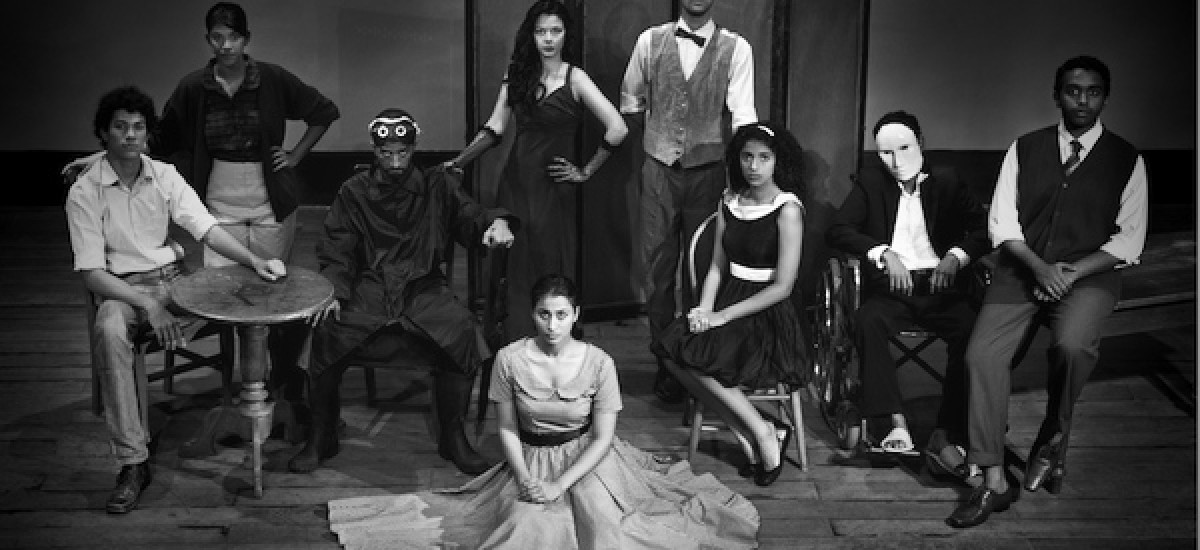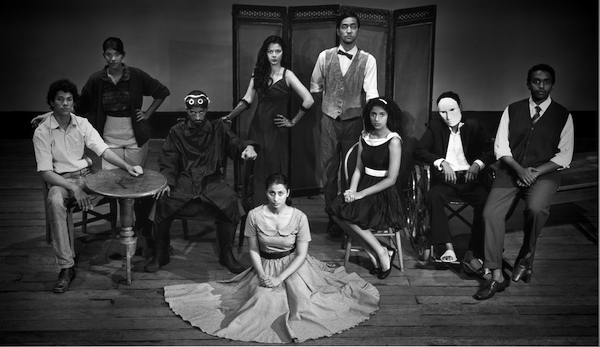Original photo courtesy Mind Adventures
Rondo is a devised theatre play, based on the theme of reconciliation, says the programme note for the production of RONDO by Tracy Holsinger and the Mind Adventures Theatre Company.
The structure of the play is episodic, with an unraveling of a series of seemingly unrelated incidents taking place between blackouts. A ‘Watcher’ watches over it all, standing on a small lighthouse like structure at the back of the stage, occasionally scanning the horizon with a spyglass and flashing a torch at the face on the ‘Visitor’, the only contemporary figure in the piece. As the Watcher rambles on in verse, at times comic and at other times obtusely philosophical, one hoped, the audience has a brief moment to ponder on what they have just seen and what it means in relation to the rest of what has been already performed. Rondo is a play that demands your complete attention. A brief moment to nod off, or to answer an emergency text message, and you lose the plot. Literally. After the play ended, on the day I saw it, the audience continued to sit. Nobody moved for a good minute or two. I think everyone was trying to digest what had just happened. Watching Rondo was a challenge to our sense of theatre, to our emotions as well as to our intellect. It reminded me of how I long for theatre that just does that, and how rarely I find it on the boards in Colombo.
There is a town. Somewhere. Sometime. A brutal double murder, a crime of passion, no less, that took place in the past, haunts the present. The Good Man, who used to be an exemplary citizen before he became the murderer, is silent, immobile, confined to a wheelchair, cared for by his son, Bartholomew. The daughter of the murdered couple, Marina, drifts along waiting to be rescued from her life. Sprightly Miss O is a budding activist who wants to bring about change peacefully and through non-violent protest. Despite her enthusiasm, as she lights her candle and sings ‘We shall Overcome’ in an ever dwindling voice, she realizes that she is out there on her own. Through her we discover that this town has withdrawn from life, imposing a Betrothal Law that forbids marriage outside the citizenry. The last time they made an exception to the rule, ‘the incident’- which is how everyone refers to the double murder, the crime of passion – happened. Now the Council has decided that such an incident will never be repeated. Councillor Mason tutors a young girl, Fig, in parrot-like behavior. Commitment to Law and Order is a guarantee of imposed homogeneity. Any potential for difference is a ‘disturbance’ that must be wiped out at all costs. Tally, the performer and the vamp, represents all that is dangerous, the portent of a challenge to stability and sameness. Yet, in the end, all seems well in this town. Everything is managed by Mason. The Law remains in place. Outsiders are not welcome here. But wait. Here is Marina, intent on killing the Good Man who ruined her life by killing her parents. Oh dear. He is already dead. Bartholomew confronts the horror (could it turn to delight?) of life on his own. They speak. She forgives the Good Man. And Bartholomew. Anti climax, leading to climax. Marina runs away with the Visitor. At last, someone gets away! Mason’s fear of the Outside is proved to be correct. Small cracks emerge. In front of the enraged Councillor, Ms. O dares to hand over her petition calling for a change in the Law. Mason crumples it and throws it to the ground in utter disdain. And yet, wait a minute, all is not lost. Fig picks it up and is reading it. A small seed of dissent is planted within her. Or is it ? Somehow, it is hard to imagine that life will ever return to ‘normal’ in that town. Or so we hope.
And being hopeful when there seems to be little to give you hope, that’s what the play is about.
Rondo is an extraordinarily well crafted piece of theatre, moving us along as an audience on a trajectory that confronts us with an Orwellian vision of life as it could be, and would be, if nobody dared to try to be different, to stand up and be counted even when you stand alone, to take life into your own hands and to be responsible for all the consequences.
The narrative structure selected by the Company is well suited to the content, and the production is smooth and gimmicks are minimal so that the attention of the audience is focused on the text and on the performances. Each actor lives within the character, so obviously devised by herself or himself as a part of the whole that what emerges and stays with us is the whole theatrical experience, within which sparkling performances by individual actors illuminate the terrible truth about human nature and its capacity to remain silent in the face of injustice and inhumanity.
And so, what about reconciliation? The Sunethra Bandaranaike Trust grant said that this should be a play about reconciliation. In the context of contemporary Sri Lanka, perhaps one expected a piece of theatre more directly related to our own current reality, in which the aftermath of a bitter and bloody war haunts our present. And perhaps not, actually. When the reality is too complex and difficult to even attempt to represent it, when the silences and absences that surround you are too enormous to be taken apart in a piece of theatre, allegory and fable become instruments of storytelling that challenge an audience to think about that reality in a different space, metaphorically. Congratulations, Tracy and the Mind Adventures Theatre Company. You did it!
Editors note: ‘Rondo’ is a devised piece – a tragicomedy about change and choices – directed by Tracy Holsinger with Arun Welendawe-Premetilleke is part of (Un)making Time, a project to support new theatre-making initiated by the Sunethra Bandaranaike Trust.
(Un)making Time brings together two new performances created by the artists – ‘Rondo’ and ‘My Other History’, written and directed by Jake Oorloff and performed by Thushara Hettihamu, Ruhanie Perera, Freya D’Almeida and Amaz Irshad.
See short take on ‘My Other History’ here.


